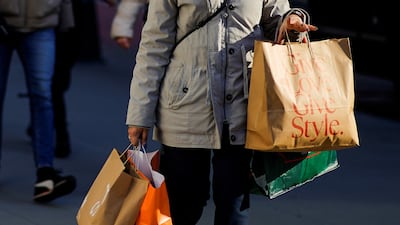Consumer confidence in the US surged to its highest level since July 2021 as consumers begin to feel the relief of inflation easing.
The Consumer Confidence Index rose to 117.0 in July, up from 110.1 in June, the Conference Board reported on Tuesday. US consumers' assessment of current business and labour market conditions also improved.
The Expectations Index, which measures the short-term outlook, rose above 80, the level that typically signals an approaching recession. Contrary to the index, there was an slight increase in consumers saying a recession was “somewhat” or “very” likely.
“Still, recession expectations remained below their recent peak, suggesting fears of a recession have eased relative to earlier this year,” said Dana Peterson, chief economist at the Conference Board.
Consumer spending has steadily recovered as the 10 interest rate increases announced by the Federal Reserve have eased the inflationary pressure burdening households.
“Headline confidence appears to have broken out of the sideways trend that prevailed for much of the last year,” Ms Peterson said.
The Fed began its latest meet on Tuesday and is expected to issue another increase of 25 basis points on Wednesday. Should it do so, the rate would climb to its highest in 22 years.
While the Fed's preferred inflation metric remains above its long-term 2 per cent goal, recent data showed that it has fallen to its lowest level since March 2021.
Consumers also remained optimistic about labour market conditions.
About 9.7 per cent of consumers said jobs were “hard to get”, lower than June's reading of 12.6 per cent, and 46.9 per cent of respondents said jobs were “plentiful”.
The labour market has plagued Fed Chair Jerome Powell and his colleagues in their quest to achieve a so-called soft landing – slowing the economy without triggering a recession.
Hiring data earlier this month was softer than expected, pointing to signs that the labour market is beginning to cool although wage growth remained strong.


